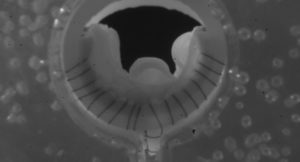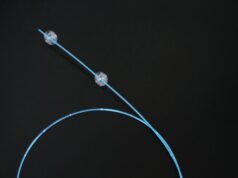
Envveno Medical has announced that it will present one-year data on all patients from the VenoValve US pivotal trial today at the VEITHsymposium (19–23 November, New York, USA). The definitive one-year data support the application submitted earlier this week by Envveno Medical seeking premarket authorisation (PMA) from the US Food and Drug Administration (FDA) to market and sell the VenoValve in the USA.
Among the data being presented at VEITH are:
- Eighty five percent of the patients in the VenoValve pivotal study that reached the one-year milestone achieved a clinically meaningful benefit of a three or more-point improvement in revised Venous Clinical Severity Score (rVCSS).
- A 7.91 point average rVCSS improvement among the rVCSS responder cohort.
- A clinical meaningful benefit was shown across all CEAP diagnostic classes of patients (C4[b], C4[c], C5, C6) enrolled in the study.
- A 97% target vein patency rate at one year.
- Haemodynamic data from the study showed a positive correlation between rVCSS improvement and systemic reflux time improvement.
The FDA previously indicated to the company that a three or more-point improvement in rVCSS would be evidence of the VenoValve’s clinically meaningful benefit.
Patients in the VenoValve pivotal study also experienced a median reduction in pain of 75% at one year as measured by Visual Analogue Scale (VAS). Additionally, among patients with venous ulcers (CEAP C6), the median ulcer area was reduced by 87% at 12 months. Patient-reported outcomes in the VenoValve pivotal study also demonstrated improvements in quality of life and disease symptoms (VEINESqol/sym, EQ5D).
The company will also update the pivotal trial safety profile of the VenoValve at VEITH, reporting major adverse events (MAEs) through one year of: one death (unrelated to the VenoValve), zero pulmonary embolisms, 12 target vein thromboses, 10 surgical pocket haematomas, four other bleeds, and seven deep wound infections. Of the patients who experienced an MAE, there was no long-term negative impact on clinical improvement as 94% of the patients who experienced an MAE (not including the unrelated death) also experienced a clinically meaningful benefit (three-point rVCSS improvement) at one year, compared to baseline.
Envveno Medical notes in a press release that the VenoValve is a potential first-in-class surgical replacement venous valve for patients with severe deep venous chronic venous insufficiency (CVI). The company estimates that there are approximately 2.5 million potential new patients each year in the US who could be candidates for the VenoValve. The company adds that it is also developing Envve, a next-generation, transcatheter-based replacement venous valve, that could appeal to an even larger market in terms of both patients and physicians.









